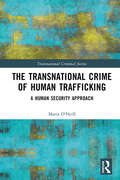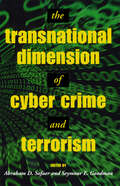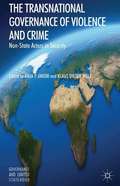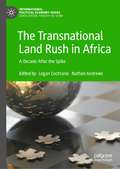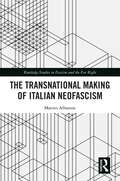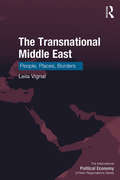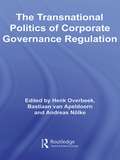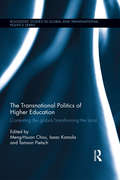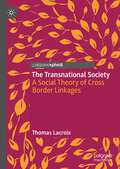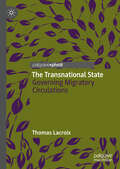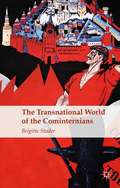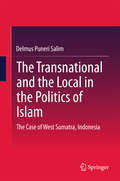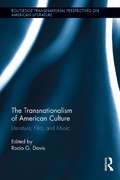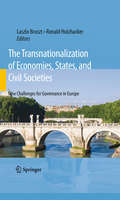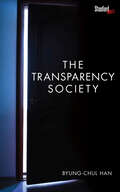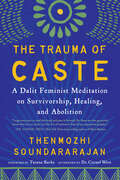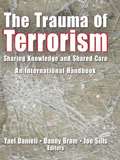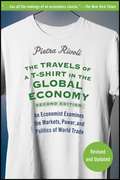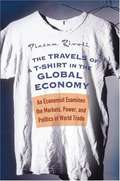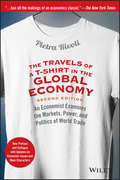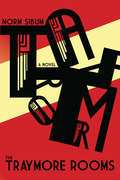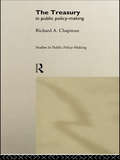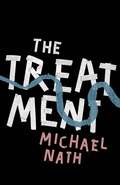- Table View
- List View
The Transnational Crime of Human Trafficking: A Human Security Approach (Transnational Criminal Justice)
by Maria O'NeillHuman trafficking is a multi-faceted crime. It suffers from definitional and implementation problems. One facet, the focus of this book, is the transnational nature of much of the crime, and the need for practitioners to operate across borders to combat it. Europe has taken a distinctive approach to cross border law enforcement and judicial cooperation, which could be used as a model in other areas of the world. This publication examines these problems from a Council of Europe and European Union perspective, including the now post-Brexit UK. The UK has adopted a distinctive approach to legislating and operationalising its trafficking in human beings (THB) legal frameworks, also legislating for “slavery, servitude, forced and compulsory labour”, resulting in distinctive results in internal UK law enforcement. It is argued here that this approach and the results should inform THB legislative and operational developments more widely. Further action in legal and operational frameworks is, however, clearly needed and the book advocates the adoption of a human security “freedom from fear” approach. Ultimately, the interaction of different legal frameworks, and different jurisdictions requires transnational practitioners to adopt a constructivist approach, as was adopted for the development of the internal EU area of freedom, security and justice. The book will be of interest to academics, researchers and policy-makers working in the areas of transnational law, migration law, criminology and international relations.
The Transnational Dimension of Cyber Crime and Terrorism
by Abraham D. Sofaer Seymour E. GoodmanIn December 1999, more than forty members of government, industry, and academia assembled at the Hoover Institution to discuss this problem and explore possible countermeasures. The Transnational Dimension of Cyber Crime and Terrorism summarizes the conference papers and exchanges, addressing pertinent issues in chapters that include a review of the legal initiatives undertaken around the world to combat cyber crime, an exploration of the threat to civil aviation, analysis of the constitutional, legal, economic, and ethical constraints on use of technology to control cyber crime, a discussion of the ways we can achieve security objectives through international cooperation, and more. Much has been said about the threat posed by worldwide cyber crime, but little has been done to protect against it. A transnational response sufficient to meet this challenge is an immediate and compelling necessity—and this book is a critical first step in that direction.
The Transnational Governance of Violence and Crime
by Anja P. Jakobi Klaus Dieter WolfBuilding upon a range of case studies that range from civil war to maritime security and cyber crime, the contributors analyse how non-state actors can and should be involved in contributing to state and human security.
The Transnational Land Rush in Africa: A Decade After the Spike (International Political Economy Series)
by Nathan Andrews Logan CochraneThis volume provides up-to-date information on what has happened in the African ‘land rush’, providing national case studies for countries that were heavily impacted. The research will be a critical resource for students, researchers, advocates and policy makers as it provides detailed, long-term assessments of a broad range of national contexts. In addition to the specific questions of land and investment, this book sheds light on the broader international political economy of development in different African countries.
The Transnational Making of Italian Neofascism (Routledge Studies in Fascism and the Far Right)
by Matteo AlbaneseThis book delves into the evolution of Italian neo-fascism from the end of World War II to the mid-1970s.It examines the transition from historical fascism to neo-fascism, highlighting the survival and adaptation of fascist ideologies within democratic frameworks. This book explores the formation and development of the Italian Social Movement (MSI) and the broader neo-fascist network, emphasising its transnational connections and ideological persistence. Key themes include the escape and reorganisation of former fascists, their influence on post-war Italian politics, and the cultural and ideological debates within the neo-fascist movement. The work also addresses the role of race, anti-communism, and the strategic alliances formed during the Cold War. By tracing the historical and ideological continuities, this book provides a comprehensive understanding of neo-fascism's enduring impact on Italian and global political landscapes.It will be of interest to students and scholars of fascism, political history, and Italian politics.
The Transnational Middle East: People, Places, Borders (New Regionalisms Series)
by Leïla VignalThe Middle East has been undergoing new crises since the powerful socio-political uprisings known as the Arab Spring took place in several countries in 2011. Some countries are experiencing a long-term collapse of their political and social structures out of internal conflicts and external interventions. The Transnational Middle East posits that, in the Middle East, the development of regional dynamics, of processes and circulations of all kinds, can be documented. In this regard, the approaches it develops — ‘bottom-up’ regionalisation, ‘globalisation from below’ — allow for a better understanding of the ways in which the Middle East is part of global transformations. The book analyses how, through their practices, Middle East societies elaborate a regional space which is not institutionalised. Based on fieldwork in the Middle East, the book provides venues for further theoretical elaboration on globalisation and contemporary societies, as well as on processes of regionalisation. It draws on the emergence of genuine regional spaces of culture, art, economic activity, human circulation — which supplement and do not contradict other infra-national, national, or global social processes. As in other areas of the world, these transformations are to a large extent the mode of the Middle East’s insertion into globalisation. In this respect, they go against standard narratives of the supposed ‘exceptionalism’ of the region. This book will be a great contribution to comparative politics, Middle Eastern studies, globalisation and international relations.
The Transnational Politics of Corporate Governance Regulation (RIPE Series in Global Political Economy #Vol. 23)
by Andreas Nölke Henk Overbeek Bastiaan Van ApeldoornThis ambitious volume explores the politics of recent changes in corporate governance regulation and the transnational forces driving the process. Corporate governance has in the 1990s become a catchphrase of the global business community. The Enron collapse and other recent corporate scandals, as well as growing worries in Europe about the rise of Anglo-Saxon finance, have made issues of corporate governance the subject of political controversies and of public debate. The contributors argue that the regulation of corporate governance is an inherently political affair. Given the context of the deepening globalization of the corporate world, it is also increasingly a transnational phenomenon. In terms of the content of regulation the book shows an increasing reliance on the application of market mechanisms and a tendency for corporations themselves to become commodities. The emerging new mode of regulation is characterized by increasing informalization and by forms of private regulation. These changes in content and mode are driven by transnational actors, first of all the owners of internationally mobile financial capital and their functionaries such as coordination service firms, as well as by key public international agencies such as the European Commission. The Transnational Politics of Corporate Governance Regulation will be of interest to students and researchers of international political economy, politics, economics and corporate governance.
The Transnational Politics of Higher Education: Contesting the Global / Transforming the Local (Routledge Studies in Global and Transnational Politics)
by Tamson Pietsch Meng-Hsuan Chou Isaac KamolaThis edited volume introduces readers to the relationship between higher education and transnational politics. It shows how higher education is a significant arena for regional and international transformation as well as domestic political struggle replete with unequal power relations. This volume shows: The causes and impacts of recent transformations in higher education within a transnational context; Emerging similarities in objectives, institutional set-ups, and approaches taking place within higher education institutions across different world regions; The asymmetrical relations between various kinds of institutional, commercial and state actors across borders; The extent to which historical and colonial legacies are important in the transformation of higher education; The potential effects these developments have on the current structure of international political order. Drawing on case studies from across the Middle East, Asia, Africa, Latin America, and Europe, the contributors develop diverse perspectives explaining the impact of transnational politics on higher education—and higher education on transitional politics—across time and locality. This book is among the first multi-disciplinary effort to wrestle with the question of how we can understand the political role of higher education, and the political force universities exert in the realm of international relations.
The Transnational Society: A Social Theory of Cross Border Linkages
by Thomas LacroixThis book is the first of a work in two parts addressing the relations between the transnational society and the state. It is dedicated to the analysis and conceptualisation of transnational societies. This work moves beyond the mere depiction of transborder socialities by shedding light on the fundamental structures underpinning them. It investigates the mechanics of their formation and evolution, their demise or transformation into diasporas. It theorises transmigrants as plural humans embedded and socialised in multiple settings, and whose activities are sustained and framed by three key social institutions: transnational families, businesses and associations. It sheds light on the construction of an intersubjective moral framework regulating the relations between migrants and non-migrants. Finally, it examines the space-time continuum of transnational societies.
The Transnational State: Governing Migratory Circulations
by Thomas LacroixThis work in two parts examines the relations between transnational societies and states. The second volume of this work contends that current policies meant to control or enhance transnational flows have led to the emergence of a transnational policy apparatus coined the transnational state. This book proposes an innovative conceptual framework to grasp the transformations of the contemporary state in both sending and receiving countries. It shows how states expand beyond national territorial limits by reaching out to migrants where they are. In response to the migrants’ endeavours to circumvent the constrains imposed by selective migration policies, public authorities expand the reach of their control beyond (externalisation), within (internalisation) and at (expansion) borders. A totalitarian temptation seems to have seized contemporary state bureaucracies, affecting the very nature of borders and societies. The core argument of this research is that the development of the transnational state is not random. It is a process shaping and shaped by the structures of the transnational society.
The Transnational World of the Cominternians
by Brigitte StuderThe 'Cominternians' who staffed the Communist International in Moscow from its establishment in 1919 to its dissolution in 1943 led transnational lives and formed a cosmopolitan but closed and privileged world. The book tells of their experience in the Soviet Union through the decades of hope and terror.
The Transnational and the Local in the Politics of Islam
by Delmus Puneri SalimThis book explores the relationship between transnational and local Islam as expressed in public discourse and policy-making, as represented in the local press. It does so against the background of local governments in majority Muslim regions across Indonesia promoting and passing regulations that mandate forms of social or economic behaviour seen to be compatible with Islam. The book situates the political construction of Islamic behaviour in West Sumatra, and in Indonesia more generally, within an historical context in which rulers have in some way engaged with aspects of Islamic practice since the Islamic kingdom era. The book shows that while formal local Islamic regulations of this kind constitute a new development, their introduction has been a product of the same kinds of interactions between international, national and local elements that have characterised the relationship between Islam and politics through the course of Indonesian history. The book challenges the scholarly tendency to over-emphasise local political concerns when explaining this phenomenon, arguing that it is necessary to forefront the complex relationship between local politics and developments in the wider Islamic world. To illustrate the relationship between transnational and local Islam, the book uses detailed case studies of four domains of regulation: Islamic finance, zakat, education and behaviour and dress, in a number of local government areas within the province.
The Transnationalism of American Culture: Literature, Film, and Music (Routledge Transnational Perspectives on American Literature)
by Rocío G. DavisThis book studies the transnational nature of American cultural production, specifically literature, film, and music, examining how these serve as ways of perceiving the United States and American culture. The volume’s engagement with the reality of transnationalism focuses on material examples that allow for an exploration of concrete manifestations of this phenomenon and trace its development within and outside the United States. Contributors consider the ways in which artifacts or manifestations of American culture have traveled and what has happened to the texts in the process, inviting readers to examine the nature of the transnational turn by highlighting the cultural products that represent and produce it. Emphasis on literature, film, and music allows for nuanced perspectives on the way a global phenomenon is enacted in American texts within the U.S, also illustrating the commodification of American culture as these texts travel. The volume therefore serves as a coherent examination of the critical and creative repercussions of transnationalism, and, by juxtaposing a discussion of creativity with critical paradigms, unveils how transnationalism has become one of the constitutive modes of cultural production in the 21st century.
The Transnationalization of Economies, States, and Civil Societies
by Ronald Holzhacker Laszlo BrusztTwo decades after the fall of the Berlin Wall, we are witnessing an ever quickening dissolution of the boundaries between internal and external actors and the critical factors for understanding domestic institutional change. In the transnationalization of the economies of Western and Eastern Europe, international cross-ownership networks are playing a growing, and at times dominant role in domestic economies. These economies are governed by states that are increasingly sharing larger and larger parts of their regulative powers with non-domestic actors. These regulations are contested by civil societies that are increasingly based on networks of interlinked domestic and external NGOs. This is an emerging research agenda extending earlier research on transnationalization, which focused on the supra-national level, and it goes beyond the Europeanization literature that focused on externally induced or imposed change in domestic institutions. This book brings together in one volume the study of transnationalization in three institutional fields: civil society, state and the economy and extends the research of processes of transnationalization to evolving new democracies and emerging market economies. This book should be of interest to scholars and students in the field of political science, public policy, European studies, and international relations.
The Transparency Society
by translated by Erik Butler Byung-Chul HanTransparency is the order of the day. It is a term, a slogan, that dominates public discourse about corruption and freedom of information. Considered crucial to democracy, it touches our political and economic lives as well as our private lives. Anyone can obtain information about anything. Everything--and everyone--has become transparent: unveiled or exposed by the apparatuses that exert a kind of collective control over the post-capitalist world. For transparency has a dark side that, ironically, it has everything to do with a lack of mystery, shadow, and nuance. Behind the apparent accessibility of knowledge lies the disappearance of privacy, homogenization, and the collapse of trust. The anxiety to accumulate ever more information does not necessarily produce more knowledge or faith. Technology creates the illusion of total containment and constant monitoring of information, but what we lack is adequate interpretation of the information. In this manifesto, Byung-Chul Han denounces transparency as a false ideal, the strongest and most pernicious of our contemporary mythologies.
The Transparent Traveler: The Performance and Culture of Airport Security
by Rachel HallAt the airport we line up, remove our shoes, empty our pockets, and hold still for three seconds in the body scanner. Deemed safe, we put ourselves back together and are free to buy the beverage we were prohibited from taking through security. In The Transparent Traveler Rachel Hall explains how the familiar routines of airport security choreograph passenger behavior to create submissive and docile travelers. The cultural performance of contemporary security practices mobilizes what Hall calls the "aesthetics of transparency." To appear transparent, a passenger must perform innocence and display a willingness to open their body to routine inspection and analysis. Those who cannot--whether because of race, immigration and citizenship status, disability, age, or religion--are deemed opaque, presumed to be a threat, and subject to search and detention. Analyzing everything from airport architecture, photography, and computer-generated imagery to full-body scanners and TSA behavior detection techniques, Hall theorizes the transparent traveler as the embodiment of a cultural ideal of submission to surveillance.
The Trauma of Caste: A Dalit Feminist Meditation on Survivorship, Healing, and Abolition
by Thenmozhi SoundararajanInstant Amazon Best Seller and Hot New ReleaseFor readers of Caste and Radical Dharma, an urgent call to action to end caste apartheid, grounded in Dalit feminist abolition and engaged Buddhism.&“Dalit&” is the name that we chose for ourselves when Brahminism declared us &“untouchable.&” Dalit means broken. Broken by suffering. Broken by caste: the world&’s oldest, longest-running dominator system...yet although &“Dalit&” means broken, it also means resilient. Caste—one of the oldest systems of exclusion in the world—is thriving. Despite the ban on Untouchability 70 years ago, caste impacts 1.9 billion people in the world. Every 15 minutes, a crime is perpetrated against a Dalit person. The average age of death for Dalit women is just 39. And the wreckages of caste are replicated here in the U.S., too—erupting online with rape and death threats, showing up at work, and forcing countless Dalits to live in fear of being outed. Dalit American activist Thenmozhi Soundararajan puts forth a call to awaken and act, not just for readers in South Asia, but all around the world. She ties Dalit oppression to fights for liberation among Black, Indigenous, Latinx, femme, and Queer communities, examining caste from a feminist, abolitionist, and Dalit Buddhist perspective--and laying bare the grief, trauma, rage, and stolen futures enacted by Brahminical social structures on the caste-oppressed. Soundararajan&’s work includes embodiment exercises, reflections, and meditations to help readers explore their own relationship to caste and marginalization—and to step into their power as healing activists and changemakers. She offers skills for cultivating wellness within dynamics of false separation, sharing how both oppressor and oppressed can heal the wounds of caste and transform collective suffering. Incisive and urgent, The Trauma of Caste is an activating beacon of healing and liberation, written by one of the world&’s most needed voices in the fight to end caste apartheid.
The Trauma of Terrorism: Sharing Knowledge and Shared Care, An International Handbook
by Yael DanieliLearn intervention strategies to counter the effects of terrorismIn the twenty-first century, terrorism has become an international scourge whose effect devastates individuals, weakens societies, and cripples nations. The Trauma of Terrorism: Sharing Knowledge and Shared Care, An International Handbook and Shared Care provides a compreh
The Travels of a T-Shirt in the Global Economy
by Pietra RivoliThe Travels of a T-Shirt in the Global Economy has been lauded by the New York Times, Financial Times, and reviewers worldwide. Translated into fourteen languages, Travels has received numerous awards for its frank and nuanced discussion of global economic realities. Now updated and revised--including a discussion of environmental issues--this fascinating book illustrates crucial lessons in economics, politics, and globalization.The major themes and conclusions from the first edition are intact, but in response to questions from readers and students around the world, the second edition now includes:Updates on the people, businesses, and politics involved in the production of the T-shirt.Discussions of environmental issues related to both international trade and the T-shirt's life story.
The Travels of a T-Shirt in the Global Economy: An Economist Examines the Markets, Power and Politics of World Trade
by Pietra RivoliRivoli (international business, Georgetown U.) starts in Texas, researching the cotton plantations and the history of American cotton, then travels with the cotton to China, watching the work go on at bottom dollar, then traces cotton's troubles at the border in terms of trade policy and the implications of the 2005 ending of protectionism. Finally, he follows the path of used cotton clothing from the U.S. to developing nations. Annotation ©2006 Book News, Inc., Portland, OR (booknews.com)
The Travels of a T-Shirt in the Global Economy: An Economist Examines the Markets, Power, and Politics of World Trade. New Preface and Epilogue with Updates on Economic Issues and Main Characters
by Pietra RivoliThe keys to global business success, as taught by a T-shirt's journey The Travels of a T-Shirt in the Global Economy is a critically-acclaimed narrative that illuminates the globalization debates and reveals the key factors to success in global business. Tracing a T-shirt's life story from a Texas cotton field to a Chinese factory and back to a U.S. storefront before arriving at the used clothing market in Africa, the book uncovers the political and economic forces at work in the global economy. Along the way, this fascinating exploration addresses a wealth of compelling questions about politics, trade, economics, ethics, and the impact of history on today's business landscape. This new printing of the second edition includes a revised preface and a new epilogue with updates through 2014 on the people, industries, and policies related to the T-shirt's life story. Using a simple, everyday T-shirt as a lens through which to explore the business, economic, moral, and political complexities of globalization in a historical context, Travels encapsulates a number of complex issues into a single identifiable object that will strike a chord with readers as they: Investigate the sources of sustained competitive advantage in different industries Examine the global economic and political forces that explain trade patters between countries Analyze complex moral issues related to globalization and international business Discover the importance of cultural and human elements in international trade This story of a simple product illuminates the many complex issues which businesspeople, policymakers, and global citizens are touched by every day.
The Traymore Rooms
by Norm SibumA MILLIONS.COM MOST ANTICIPATED BOOK OF 2013A HYPOALLERGIC FALL LITERARY RELEASE TO KNOW ABOUT"Norm Sibum is not everyone's cup of tea ... instead of breathing air he inhales the exhaust of apocalyptic times."-Books in CanadaA place: the Traymore Rooms, downtown Montreal, an old walk-up. Those who live there and drink at the nearby café form the heart of Traymorean society. Their number includes: Eggy, red-faced, West Virginian, a veteran of Korea; Eleanor R (not Eleanor Roosevelt); Dubois, French Canadian, optimist; Moonface, waitress-cum-Latin-scholar and sexpot inexpert; and, most recently, our hero Calhoun. A draft dodger and poetical type.For a time all is life-as-usual: Calhoun argues with Eggy and Dubois, eats Eleanor's cobblers, gossips of Moonface, muses on Virgil and the current President. With the arrival of a newcomer to Traymore, however, Calhoun's thoughts grow fixated and dark. He comes to believe in the reality of evil. This woman breaks no laws and she inflicts no physical harm-yet for the citizens of Traymore, ex-pats and philosophers all, her presence becomes a vortex that draws them closer to the America they dread.Intelligent and frighteningly absurd, with a voice as nimble as Gass's and satire that pierces like Wallace's, The Traymore Roomsis a sustained howl against libertarianism under George W. Bush.Norm Sibum has been writing and publishing poetry for over thirty years. Born in Oberammergau in 1947, he grew up in Germany, Alaska, Utah, and Washington before moving to Vancouver in 1968. The Traymore Rooms is his first novel.
The Treasury in Public Policy-Making (Studies In Public Policy Making Ser.)
by Prof Richard ChapmanAnalyses the Treasury's role in public policy making and makes an original contribution to knowledge about the current work of the Treasury.The book focuses on three main areas:* the development of the Treasury from earliest times to the present* the current structure and organization of the Treasury following the radical changes which took place i
The Treatment
by Michael Nath'Simply the best British novel I've read this century' David Peace'Will stay in my head forever...a fantastic book' The Tablet'A maverick project that defies comparison' MetroAn ArtsDesk Best Book of 2020At a bus stop in south London, black teenager Eldine Matthews is murdered by a racist gang. Twenty years later, L Troop's top boys - models of vice, deviance and violence - are far beyond justice. There are some people the law will not touch.But Eldine's murder is not forgotten. His story is once again on everyone's lips and the streets of south London; a story of police corruption and the elimination of witnesses. A solicitor, a rent boy, a one-eyed comedian and his minder are raising ghosts; and Carl Hyatt, disgraced reporter, thinks he knows why.There's one man linking this crew of rambunctious dandies and enchanting thugs, and it's the man Carl promised never to challenge again: Mulhall, kingpin of London's rotten heart and defender of L Troop's racist killers. Carl must face up to the morality of retribution and the reality of violence knowing that he is the weak link in the chain; and that he has placed everyone he loves within Mulhall's reach.The Treatment is steeped in London's criminal past, its shadows of corruption and institutional racism. Like a seventeenth-century revenge tragedy, its characters reel from the streets, bars and brothels, hyperarticulate and propelled by wild justice.
The Treatment
by Michael Nath'Simply the best British novel I've read this century' David Peace'Will stay in my head forever...a fantastic book' The Tablet'A maverick project that defies comparison' MetroAn ArtsDesk Best Book of 2020At a bus stop in south London, black teenager Eldine Matthews is murdered by a racist gang. Twenty years later, L Troop's top boys - models of vice, deviance and violence - are far beyond justice. There are some people the law will not touch.But Eldine's murder is not forgotten. His story is once again on everyone's lips and the streets of south London; a story of police corruption and the elimination of witnesses. A solicitor, a rent boy, a one-eyed comedian and his minder are raising ghosts; and Carl Hyatt, disgraced reporter, thinks he knows why.There's one man linking this crew of rambunctious dandies and enchanting thugs, and it's the man Carl promised never to challenge again: Mulhall, kingpin of London's rotten heart and defender of L Troop's racist killers. Carl must face up to the morality of retribution and the reality of violence knowing that he is the weak link in the chain; and that he has placed everyone he loves within Mulhall's reach.The Treatment is steeped in London's criminal past, its shadows of corruption and institutional racism. Like a seventeenth-century revenge tragedy, its characters reel from the streets, bars and brothels, hyperarticulate and propelled by wild justice.
